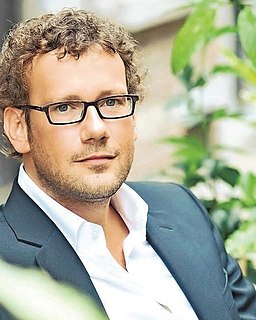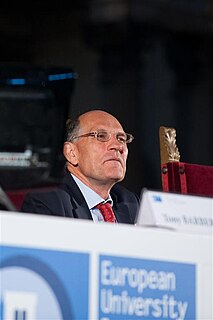Related Research Articles

Political sociology is an interdisciplinary field of study concerned with exploring how governance and society interact and influence one another at the micro to macro levels of analysis. Interested in the social causes and consequences of how power is distributed and changes throughout and amongst societies, political sociology's focus ranges across individual families to the State as sites of social and political conflict and power contestation.
As a subfield of public economics, fiscal federalism is concerned with "understanding which functions and instruments are best centralized and which are best placed in the sphere of decentralized levels of government". In other words, it is the study of how competencies and fiscal instruments are allocated across different (vertical) layers of the administration. An important part of its subject matter is the system of transfer payments or grants by which a central government shares its revenues with lower levels of government.
Governance is the process of interactions through the laws, norms, power or language of an organized society over a social system. It is done by the government of a state, by a market, or by a network. It is the decision-making among the actors involved in a collective problem that leads to the creation, reinforcement, or reproduction of social norms and institutions". In lay terms, it could be described as the political processes that exist in and between formal institutions.

Comparative politics is a field in political science characterized either by the use of the comparative method or other empirical methods to explore politics both within and between countries. Substantively, this can include questions relating to political institutions, political behavior, conflict, and the causes and consequences of economic development. When applied to specific fields of study, comparative politics may be referred to by other names, such as comparative government.

Seymour Martin Lipset was an American sociologist and political scientist. His major work was in the fields of political sociology, trade union organization, social stratification, public opinion, and the sociology of intellectual life. He also wrote extensively about the conditions for democracy in comparative perspective. A socialist in his early life, Lipset later moved to the right, and was often considered a neoconservative.
Multi-level governance is a term used to describe the way power is spread vertically between many levels of government and horizontally across multiple quasi-government and non-governmental organizations and actors. This situation develops because many countries have multiple levels of government including local, regional, state, national or federal, and many other organisations with interests in policy decisions and outcomes. International governance also operates based on multi-level governance principles. Multi-level governance can be distinguished from multi-level government which is when different levels of government share or transfer responsibility amongst each other. Whereas multi-level governance analyses the relationship of different state levels and interaction with different types of actors.'

In political science and sociology, a cleavage is a historically determined social or cultural line which divides citizens within a society into groups with differing political interests, resulting in political conflict among these groups. Social or cultural cleavages thus become political cleavages once they get politicized as such. Cleavage theory accordingly argues that political cleavages predominantly determine a country's party system as well as the individual voting behavior of citizens, dividing them into voting blocs. It is distinct from other common political theories on voting behavior in the sense that it focuses on aggregate and structural patterns instead of individual voting behaviors.
John Loughlin is a British-based academic and educator from Northern Ireland, and a noted specialist in European territorial politics. After being educated in St. Malachy's College, he spent several years as a Cistercian monk at Our Lady of Bethlehem Abbey, Portglenone, Northern Ireland, where he carried out the usual studies for the priesthood in philosophy, theology and biblical studies. He is currently a Fellow at Blackfriars, Oxford. He is an Emeritus Fellow and former Tutor at St Edmund's College, where he was Director of the Von Hügel Institute, and a Senior Fellow and Affiliated Lecturer in the Department of Politics and International Studies, both at the University of Cambridge.
Walter Mattli is a Supernumerary Fellow at St. John's College. He served as Fellow in Politics at St. John's College and Professor of International Political Economy in the Department of Politics and International Relations at Oxford University. Professor Mattli was a Senior member of the Oxford international relations society.
Postfunctionalism is a theory of European integration put forward by Liesbet Hooghe and Gary Marks.

Dave Sinardet is a Belgian political scientist, author and columnist.
Liesbet Hooghe is a political scientist, currently serving as the W. R. Kenan Jr. Professor of Political Science at the University of North Carolina at Chapel Hill. She is also a research fellow at the European University Institute, Florence. In a list of 400 top political scientists at Ph.D. granting institutions in the US, published in Political Science & Politics, she was ranked as the fifth most-cited woman scholar in political science.

Hans Emiel Aloysius Bruyninckx is a Belgian political scientist and international relations scholar specialized in international environmental governance and European environmental politics. He has headed the European Environment Agency since 2013. While in this position, he is on leave from his posts as Professor of International Relations and Global Environmental Governance, Institute for International and European Policy; and Director, Research Institute for Work and Society, both at the Katholieke Universiteit Leuven.
Sergio Fabbrini is an Italian political scientist. He is Dean of the Department of Political Science and Professor of Political science and International relations at Libera Università Internazionale degli Studi Sociali Guido Carli in Rome, where he holds the Intesa Sanpaolo Chair on European Governance. He has also the Pierre Keller Visiting Professorship Chair at the Harvard University, Kennedy School of Government (2019/2020). He is the co-founder and former Director of the LUISS School of Government He is also recurrent professor of Comparative Politics at the Institute of Governmental Studies at the University of California at Berkeley.

Raffaele Marchetti is an Italian political scientist and editorialist.
A Provincial Council is the administrator and governing body of a province of Spain. It is one of the entities that make up local government in Spain. The Council is made up of a president, vice presidents, an executive committee and the plenary assembly of deputies.
Renaud Dehousse is a Belgian lawyer and professor, born on the 2 June 1960 in Liège, Belgium. He is currently President of the European University Institute (EUI) in Florence, Italy.

Stefano Bartolini is an Italian political scientist and professor at European University Institute in Florence, Italy. He is the author of many books and publications.
Politicisation is a concept in political science and theory used to explain how ideas, entities or collections of facts are given a political tone or character, and are consequently assigned to the ideas and strategies of a particular group or party, thus becoming the subject of contestation. Politicisation has been described as compromising objectivity, and is linked with political polarisation. Conversely, it can have a democratising effect and enhance political choice, and has been shown to improve the responsiveness of supranational institutions such as the European Union. The politicisation of a group is more likely to occur when justifications for political violence are considered acceptable within a society, or in the absence of norms condemning violence.
Critical juncture theory focuses on critical junctures, i.e., large, rapid, discontinuous changes, and the long-term causal effect or historical legacy of these changes. Critical junctures are turning points that alter the course of evolution of some entity. Critical juncture theory seeks to explain both (1) the historical origin and maintenance of social order, and (2) the occurrence of social change through sudden, big leaps.
References
- ↑ "Home". Gary Marks. Retrieved 4 August 2021.
- ↑ "Test Page for the Apache HTTP Server on Red Hat Enterprise Linux".
- ↑ "Home". Gary Marks. Retrieved 4 August 2021.
- ↑ "UNC-Chapel Hill Department of Political Science faculty directory."
- ↑ "Prof.dr. G. Marks (VU Political Science faculty directory)". Archived from the original on 13 October 2013. Retrieved 22 October 2013.
- ↑ "Books".
- ↑ “Humboldt Research Award granted to Gary Marks”
- ↑ "American Political Science Association > MEMBERSHIP > Organized Sections > Organized Section 1: Daniel Elazar Distinguished Federalism Scholar Award". www.apsanet.org. Retrieved 4 August 2021.
- ↑ "UNC-Chapel Hill Department of Political Science faculty directory."
- ↑ Gary Marks, "Structural Policy and Multilevel Governance in the EC," in Alan Cafruny and Glenda Rosenthal, eds., The State of the European Community, (New York: Lynne Rienner,1993), 391–410.
- ↑ Michael Stein and Lisa Turkewitsch, “The Concept of Multi-level Governance in Studies of Federalism,” http://paperroom.ipsa.org/papers/paper_4081.pdf.
- ↑ Piattoni, Simona (2009). "Multi-level Governance: a Historical and Conceptual Analysis." European Integration, 31 2: 163–180.
- ↑ Gary Marks, Francois Nielsen, Jane Salk, and Leonard Ray, "Competencies, Cracks, and Conflicts: Regional Mobilization in the European Union," Comparative Political Studies, 29, 2, 1996. p.167, quoted in Simona Piattoni, The Theory of Multi-Level Governance: Conceptual, Empirical, and Normative Challenges (Oxford: Oxford University Press, 2010).
- ↑ Henrik Enderlein, Sonja Wälti, Michael Zürn, eds., Handbook on Multi-Level Governance (Cheltenham: Edward Elgar, 2010), Introduction.